Having grown up in the 1950s, I knew a time in which you could not commune without announcing for the Sacrament, attending a Friday evening service of corporate confession, and having some expectation of having fasted prior to receiving the Lord's body and blood. This was in the LUTHERAN Church. But it was normal, ordinary, and hardly questioned. It was presumed that there were things we could and should do to make ready our participation in the Divine Service. Hearing the Word meant knowing the Word of the Lord and being in that Word more than on Sunday morning. Communing meant acknowledging our sins, confessing them, and receiving absolution. In our push to have the Sacrament offered more often, something had to change and, sadly, one of the things that disappeared were the outward preparations I just spoke about.
Furthermore, growing up the hymnals were not in some rack in the pews but brought from home. Sure, there was a stack in the back for visitors and the forgetful but hardly anyone forgot (and there were not all that many visitors). In other words, the hymnal was first in the home before it was in the Church. The hymnal was not simply a book on a table, shelf, or piano but one of the instruments of our devotion, prayer, and praise. As much as we want that to happen today, the hymnal is largely known and experienced in Church and not seen as a book for the home or the private devotional life of the Lutheran Christian. That is so sad but its loss is not merely something peripheral but essential.
I wonder if part of the problems of retaining our people have not proceeded from the common presupposition that there is nothing needful or all that beneficial about preparing for the Divine Service. We often head to worship with about as much preparation as we would stop for an ice cream cone or pick up an impulse item as we wait to check out from the store. Because these have been so minimized or forgotten, what we meet for, what happens in, and what we receive from the Divine Service has also been affected -- rendered more mundane, ordinary, and routine. That is a problem. For everything in life that we deep special, there are accompanying things, rites, preparations, and such that we do in anticipation of the event itself. Why have we minimized these when it comes to the Divine Service? Or have we said so often that worship is casual and ordinary that we no longer believe anything happens there that is worth the effort or needs preparation?
Maybe we cannot and should not go back to what I knew as a child growing up. But that does not mean we should be content with things as they are. Godly preparation are not what make us worthy but they do contribute to how we receive and how we value what we receive as God's Word is read and preached, we are absolved of our sins, we receive the very Body and Blood of Jesus, and we respond with prayer and praise. One of the paths to renewal involves this godly preparation which has become so yesterday in a world of today. But it may be precisely the yesterday we need in order to rejoice over what receive right now. The posture of praise and prayer is learned and practiced and prepared so that mind, heart, body, and soul may rejoice in the fullness of the gift and the appreciation which comes from faith.

2 comments:
Just as the argument about dress during worship (“Would you wear THAT to meet the president?”), so with preparation. I do not go to private confession nearly often enough. However, I do some of the things Pastor Peters mentions. I don’t say that to gain kudos from people or God, but I know that if I am not in some way prepared to meet Jesus on Sundays, the rest of the week is different. The Liturgy on Sunday becomes full, and fulfilling when I prepare.
Even the Reformed had confessional services at one time and would get tokens to be admitted to communion on Sunday. The unsolved mystery is who made the call to discontinue these services and when? Did somebody rediscover the case of the Nürnberg general absolution and make the case that a separate confessional service was unnecessary and impractical if the Sacrament was to be increasingly offered more frequently?
Post a Comment